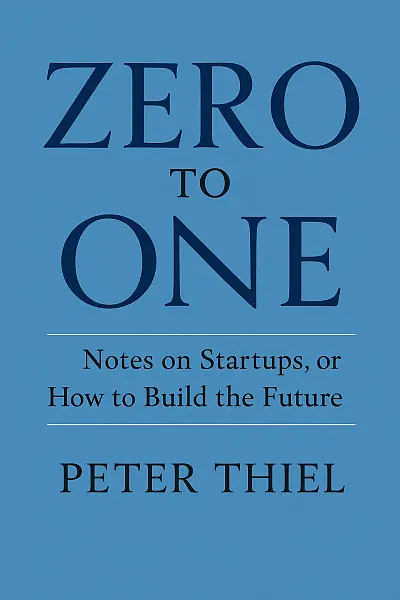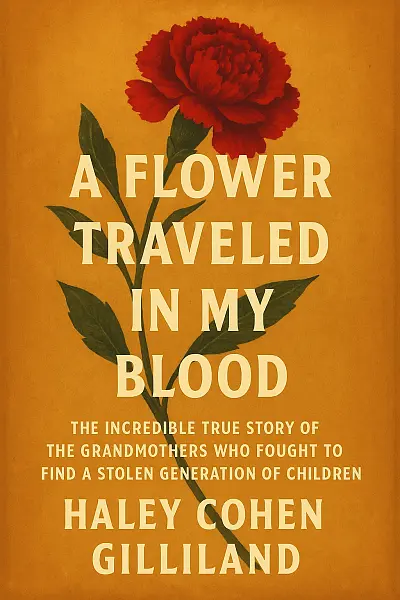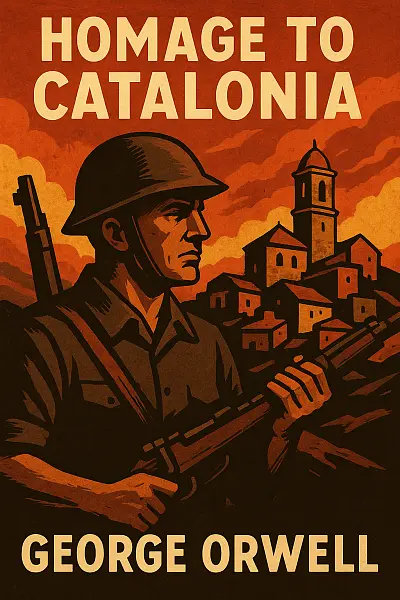
Zero to One: Notes on Startups, or How to Build the Future
by: Peter Thiel
Peter Thiel—visionary entrepreneur in the competitive world of Silicon Valley—observes a tech scene obsessed with small improvements and repetition. He grows restless, sensing society has settled for incremental change instead of bold innovation.
When Thiel challenges the status quo, he triggers a deeper search: Can we push beyond convention and uncover big, hidden opportunities? Now he urges new founders to think for themselves—to spot secrets no one else sees—risking failure, yet hoping to create something radically original.
Delivered in his sharp, contrarian style, Thiel’s approach feels like a wake-up call: Will these daring minds dare to leap from zero to one?
""The future belongs to those bold enough to chart new maps instead of merely following worn paths.""
Let's Break This Down
The Author's Voice
Atmosphere:
Zero to One buzzes with intellectual energy and a relentless, forward-looking optimism. The mood is a heady mix of challenge and encouragement—Peter Thiel’s world is one where bold ideas can rewrite the future, but only if you're brave (and smart) enough to question everything. There’s a cool, cerebral vibe throughout, with confidence and a hint of contrarian daring. Expect an atmosphere that’s more “startup pitch” than fireside chat—high stakes, high ambition, almost crackling with the urge to disrupt and invent.
Prose Style:
Thiel’s writing is crisp, direct, and supremely economical. Sentences are short, punchy, and clear—there’s no wasted motion, no indulgent detours. He favors provocative statements and memorable aphorisms (“brilliant thinking is rare, but courage is in even shorter supply”), crafting his arguments with sharp edges and absolute clarity. The tone often dips into the didactic, but it’s never stuffy; Thiel speaks with the authority of someone who’s been there, done that, and wants to cut through the noise. Technical discussions are stripped of needless jargon, with emphasis on big, universal concepts rather than narrow, nitty-gritty details.
Pacing:
This is a brisk, no-nonsense read—each chapter gets to the point and then moves right along. There’s a strong sense of movement, driven by Thiel’s focus on essential ideas rather than elaborate storytelling. He skips over personal anecdotes in favor of drawing quick, punchy lessons from both history and his own career. The book moves at a relentless, almost breathless pace—rarely lingering, always propelling the reader toward the next idea, insight, or challenge. Don’t expect slow builds or meandering narrative; every section feels like a call to action.
Tone & Voice:
Thiel’s voice is unmistakably confident—sometimes bordering on provocative or even cocky, but always compelling. He mixes the cool detachment of an investor sizing up opportunity with the passionate conviction of a true believer. There’s plenty of "contrarian wisdom" here, and the delivery is tailored for careful thinkers who appreciate bold statements and unapologetic opinions. Throughout, Thiel assumes an audience hungry for big ideas and ready to be pushed out of their comfort zone.
What You Can Expect:
If you love bold, business-minded manifestos written in a clear, commanding style, Zero to One will hook you from page one. Expect a lean, cerebral, high-energy read packed with big-picture thinking and lively, no-frills prose—a book that inspires you to question everything you think you know about innovation and progress.
Key Moments
-
“Bracing call to build monopolies, not compete for crumbs—ditch competition, dream bigger”
-
“Contrarian wisdom: asking ‘What valuable company is nobody building?’ flips the startup script”
-
“Epic slam on lean startup dogma—bold vision beats incrementalism every single time”
-
“Thiel’s tech-famous ‘Power Law’ chapter—why one breakout bet matters more than a thousand safe plays”
-
“Crisp anecdotes from PayPal’s wild early days—panic, paranoia, and billion-dollar ideas in a cramped office”
-
“Provocative jabs at pessimism—relentless optimism as an entrepreneurial superpower”
-
“Deconstruction of definite vs. indefinite thinking—why believing in a planned future is pure startup rocket fuel”
Plot Summary
Zero to One: Notes on Startups, or How to Build the Future isn’t your typical narrative-driven book—think of it more as an engaging masterclass in startup philosophy and entrepreneurship. Peter Thiel, with Blake Masters, guides readers from his early observations about progress and technology to bold new ways of thinking about business. He challenges readers to build companies that don’t just compete but create entirely new markets (going from "zero to one" rather than "one to n"). The book’s clever “twist” is Thiel’s assertion that most businesses are stuck copying each other instead of taking real, innovative leaps. The climactic idea is that the future belongs to those who invent it, resolved in a call for readers to think for themselves, develop unique insights, and act boldly.
Character Analysis
Peter Thiel takes center stage, not as a fictional character, but as a deeply opinionated and intellectually provocative mentor. He plays the role of a contrarian guide, challenging conventional wisdom and pushing for original thought. Throughout the book, Thiel’s perspective evolves from sharing personal anecdotes (like PayPal’s founding drama) to broader, actionable advice for aspiring entrepreneurs. Though not a story with traditional characters, the "readers" themselves are meant to take on an active role, developing their own thinking and ambitions as guided by Thiel's tough-love mentorship.
Major Themes
A huge, recurring theme is innovation vs. competition. Thiel argues that true progress comes from doing something completely new, not just improving on or mimicking what already exists. Another major thread is the value of contrarian thinking—believing in secrets others ignore, and daring to make bold, unpopular moves (like investing in monopolies rather than idolizing competition). Thiel also tackles the nature of progress, questioning whether society’s making real strides or just repeating itself, and warns against stagnation, pushing for a mindset that actively builds the future rather than coasting into it. His anecdotes about PayPal, Facebook, and other tech giants bring these themes into sharp, often surprising relief.
Literary Techniques & Style
Thiel’s writing style is crisp, persuasive, and sometimes provocatively blunt—he loves aphorisms (“Brilliant thinking is rare, but courage is in even shorter supply than genius”) and rhetorical questions to make you pause and reflect. The structure is part memoir, part lecture, with each chapter exploring a different "contrarian" lesson. While there isn’t much metaphor or symbolism in the traditional sense, Thiel uses sharp analogies (like “monopoly” businesses vs. “competition”) to clarify abstract concepts. The tone is intimate yet challenging, as if Thiel is both your coach and your chief skeptic.
Historical/Cultural Context
Published in 2014, Zero to One lands right in the middle of Silicon Valley’s startup gold rush, when disruption, tech unicorns, and venture capital were hot topics. Thiel draws on his first-hand experience as a founder and investor during a time of rapid innovation (the early 2000s into the 2010s). The book is very much a product of American tech optimism, laced with skepticism about conventional paths, reflecting both the culture of big tech and the broader post-recession mood of questioning old systems.
Critical Significance & Impact
Zero to One quickly became a sort of touchstone for entrepreneurs and thinkers—celebrated for its clear-headed rejection of business clichés and its challenge to think differently. It’s been praised for making “startup philosophy” both rigorous and accessible, though some critics argue that Thiel’s contrarianism can oversimplify complex issues. Despite any controversy, the book’s emphasis on genuine originality over imitation has left a lasting mark, echoing in business books and startup culture everywhere.

Breakthrough ideas, not competition—reimagining how startups shape tomorrow
What Readers Are Saying
Right for You If
If you’re the kind of person who geeks out over startups, tech innovation, or just loves a behind-the-scenes look at how massively successful companies get built, Zero to One should definitely be on your radar. Seriously, if you like business books with a sharp, unconventional perspective (think The Lean Startup or anything by Malcolm Gladwell), you’ll find tons to chew on here.
- Entrepreneurs and aspiring founders? This book’s basically a pep talk wrapped in hard truths and actionable ideas. Thiel isn’t shy about challenging startup clichés, so if you want to question the usual advice and really think differently, you’ll find yourself nodding along (or debating in the margins).
- Fans of big-picture, future-focused thinking: Thiel goes deep into what it actually takes to create something truly new, not just another slightly better app. If you enjoy topics like disruptive innovation or the nuts and bolts of Silicon Valley, this will grab you.
- Anyone curious about business strategy or investment: Even if you’re not starting your own company, you’ll pick up a lot about how and why some ventures thrive where others fizzle.
But let’s be real: if you’re not into the whole startup/business scene, or you prefer novels, memoirs, or stories over frameworks and manifesto-style writing, this might not hit the spot. Thiel’s ideas can be pretty opinionated (sometimes even a bit contrarian), and the tone is more “here’s how I think the world works” than “let’s all brainstorm together.”
If you want breezy storytelling or motivational self-help, you might struggle to get into it. And if you’re hoping for step-by-step tactics or a lot of hands-on practical advice, this one’s more about shifting your mindset than giving you a detailed to-do list.
In short: If you love thought-provoking takes on innovation, business, or the startup world―jump in. If that all sounds like homework, you’re probably better off skipping it.
What You're Getting Into
Curious about inventing the future, not just competing with the present?
Zero to One: Notes on Startups, or How to Build the Future by Peter Thiel invites you into the bold mind of a Silicon Valley icon, exploring how truly groundbreaking ideas leap from zero to one—creating something utterly new from nothing.
- Main premise: It’s a smart, candid roadmap for founders and dreamers who want to shatter conventions, build world-changing companies, and ask questions nobody else is asking.
- Central conflict: The book constantly challenges you—are you building something unique, or just repeating what’s already out there?
- Overall vibe: Inspiring, provocative, and brimming with unconventional wisdom, it’s like chatting with a fiercely opinionated mentor who wants you to think deeper, act bolder, and challenge every assumption.
Characters You'll Meet
-
Peter Thiel: Visionary entrepreneur and co-author who drives the book’s core philosophy, sharing lessons from his experience founding PayPal and investing in tech startups. He challenges conventional wisdom and encourages readers to seek bold, creative opportunities to build the future.
-
Blake Masters: Co-author and former Stanford student whose detailed class notes form the backbone of the book. Masters structures Thiel’s ideas into accessible, thought-provoking insights for aspiring entrepreneurs.
-
Elon Musk: Referenced as a prime example of a founder breaking new ground; Thiel discusses Musk’s risk-taking and innovation, especially regarding SpaceX and Tesla, to illustrate contrarian thinking and the pursuit of difficult, valuable problems.
-
PayPal Mafia: A collective of influential PayPal alumni (including Thiel, Musk, and others) showcased as embodiments of startup culture, teamwork, and the explosive impact a tight-knit founding group can have on tech and society.
More Like This
If you found The Lean Startup by Eric Ries fascinating, Zero to One will feel like its brilliant, contrarian cousin. While The Lean Startup champions iteration and constant adaptation, Peter Thiel pushes you to imagine game-changing leaps and carve out truly unique territory—a notion that will challenge and invigorate anyone who's loved Ries’s approach but craves a dose of bold, unconventional wisdom.
Fans of Good to Great by Jim Collins will recognize a similar obsession with dissecting what sets extraordinary companies apart from the rest, but Thiel takes it further with his unapologetic emphasis on monopoly and innovation as the engines of lasting success. Where Collins zeroes in on discipline and team culture, Thiel invites you into the uncomfortable, exhilarating world of creating something the world has never seen.
If you’ve ever been absorbed by the HBO series Silicon Valley, you’ll get a kick out of how Zero to One echoes its sharp, satirical lens on tech culture and startup ambition. Thiel lays bare the real philosophies and power plays that drive the industry, minus the over-the-top antics, but with plenty of the thrilling, high-stakes energy that keeps you coming back for more.
Critic's Corner
What if the single biggest mistake we’re making about innovation is confusing improvement with true invention? "Zero to One" ricochets off this radical premise—daring us to confront whether we’re really creating anything new, or just rehashing the tried and true. Peter Thiel invites readers to look for secrets hiding in plain sight, pushing us to escape the comfortable gravity of the familiar and reach for the one-of-a-kind. The book isn’t just a map for startups; it’s a rallying cry for anyone restless about the future.
Stylistically, Thiel wields a brisk, lucid prose that’s both approachable and pointedly direct. Zero to One is refreshingly lean—never bogged down in jargon or overlong digressions. Thiel’s voice carries the confidence of someone who’s both theorized and built at the very highest level, and he peppers the text with distilled, punchy observations. The short, titled sections make for rapid reading, and there’s a memorable clarity in his metaphors (the “secrets,” the “last mover advantage”) that lingers long after you’ve put the book down. However, while his assertive arguments are stimulating, the lack of counterpoints or broader context can sometimes make the book feel like an echo chamber of Thiel’s worldview. More dialogue with opposing schools of thought could have sharpened his points and broadened the appeal.
Thematically, Zero to One is driven by the hunt for originality. Thiel underscores a deep skepticism of incrementalism, arguing that copying paths already trodden is a race no one can win—what matters is forging the pathless trail. The book’s most vital insight is the idea that monopoly, not competition, is the engine of real progress; true value is found not in being better, but in being first and irreplaceably different. Thiel’s challenge to “think for yourself” resonates far beyond entrepreneurship—posing philosophical questions about risk, conformity, and the courage to pursue the unknown. In our copycat culture, this is a powerful rebuke, though perhaps a tad idealistic. Thiel’s belief in the value of secrets is at once a critique of conventional wisdom and a reminder that there’s still magic—and risk—in chasing something new.
In the crowded world of business advice, Thiel’s book stands apart for its intellectual ambition. Unlike the anecdotal “how I did it” memoirs or formulaic startup guides, Zero to One is more blueprint than checklist—closer in spirit to The Innovator’s Dilemma than to standard business fare. Zero to One shares DNA with other contrarian thinkers (think Malcolm Gladwell or Nassim Nicholas Taleb) but trades in certainty over speculation, making it both provocative and polarizing.
That’s both its glory and its Achilles heel: Thiel’s uncompromising clarity can sometimes tip into dogmatism, and skeptics may wish for more humility or nuance, particularly when discussing success and structural inequality. Yet as a call to action—and a spark for ambitious thinkers—it’s hard to beat. Zero to One matters now because it insists that building the future means dreaming bigger than the status quo, and, flaws aside, it’s a modern classic of ambitious business writing.
Community Thoughts
I couldn't stop thinking about Thiel's idea that competition is for losers. That one line echoed in my head all week, making me question every decision at work. It’s rare a business book actually lingers like that.
honestly, that chapter where thiel talks about monopolies vs competition just kept spinning in my head. i couldn't stop thinking about how every startup i knew fit into those categories. wild how he makes you question the basics.
one sentence echoed in my mind for days: "brilliant thinking is rare, but courage is in even shorter supply." i kept circling back, wondering what future i could dare to build. thiel's ideas nagged at my routine ambitions.
there was this one part where thiel questions competition so brutally it made me rethink every group project i ever joined. i couldn’t stop replaying that line in my head. wild how a book about startups messes with your sleep like that.
I never thought a business book would keep me awake at night, but Thiel’s insistence that competition is for losers haunted my dreams. That line just echoed in my head—what if I’ve been thinking about success completely wrong?
Leave Your Review
Local Take
Why It Matters
If we're talking about how "Zero to One" resonates in Japan, things get super interesting!
-
Thiel’s advocacy for bold risk-taking and individuality feels like a challenge to Japan’s group-centric culture, where conformity and harmony (wa) are highly prized. The idea that true innovation comes from “going against the grain” can clash here, yet it also seriously intrigues young entrepreneurs yearning for a break from tradition.
-
Parallel historical echoes: Japan's postwar economic miracle was built on incremental improvements (kaizen), not disruptive leaps—almost the opposite of Thiel's vision. But! The disruptive startup boom in Tokyo in the 2010s shows a rising hunger for that "zero to one" leap.
-
Literary echoes: Thiel’s contrarian boldness feels pretty alien compared to Japan’s business literature, which often highlights endurance, consensus, and long-term relationships. His style jolts readers out of their comfort zone.
-
Ultimately, Zero to One feels like a wake-up call—provocative, a bit rebellious, yet surprisingly energizing for anyone who's ever dreamed of transforming Japan's future.
Food for Thought
Controversies:
Zero to One has sparked controversies particularly around Peter Thiel’s outspoken views on competition and monopoly, with critics arguing that his advocacy for monopolistic business strategies contradicts broader values of open markets. Additionally, Thiel’s political affiliations and public statements have fueled cultural debates, often overshadowing the book’s business advice and sparking polarized reactions among readers.
Like what you see? Share it with other readers







